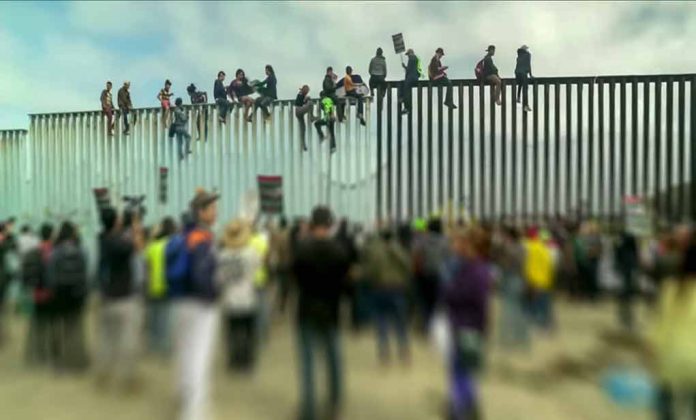
Biden’s immigration policies are under the microscope as criticism mounts, suggesting consequences that could reshape the 2024 post-election landscape.
At a Glance
- Projected arrival of nearly nine million inadmissible migrants by 2025 raises border security concerns.
- Economists warn of economic strains such as pressing wages down and escalating housing costs.
- Criticism focuses on Homeland Security Secretary Alejandro Mayorkas’s handling of border policies.
- The issue is set to influence immigration debates in post-2024 election times.
Criticism of Immigration Policies
Criticism of the Biden administration’s immigration policies has intensified following predictions of nearly nine million inadmissible migrants arriving via the southern border by early 2025. This surge has sparked debates about border security under the guidance of Homeland Security Secretary Alejandro Mayorkas. Analysts argue that current policies have inadequately fortified border defenses, creating humanitarian concerns for migrants facing perilous conditions during their journey to the U.S.
The consequences of these immigration policies, especially in border cities and states, mean adjusting to increased pressure on public resources like housing and employment. As noted by economist E.J. Antoni, these conditions have led to wage suppression and escalated housing costs, further burdening an already stressed economy.
Unfortunately, the statistics say otherwise… 9 million illegal immigrants have entered the U.S. under Joe Biden.
Tweets like this are too little too late.
Biden must reimplement the Trump immigration policies that worked. He could do it with the stroke of a pen. https://t.co/ZgMcGwVp0b
— Marsha Blackburn (@VoteMarsha) February 26, 2024
Economic Impacts and Critiques
Economists are warning that the increase in migrant inflow could have lasting impacts on the U.S. economy. E.J. Antoni noted a 4.2% decline in real compensation for U.S. workers since 2020, attributing part of this decline to the reliance on cheaper migrant labor instead of investment in productivity-enhancing technologies. This situation has prompted renewed focus on the economic ripple effects caused by immigration, underscoring vulnerabilities in the labor market.
Federal funding for migrant services remains a contentious issue, as local governments struggle with the lack of timely support. Cities like New York face challenges in providing for increased populations, with estimations of a $12 billion cost by 2025. Mayor Eric Adams has been vocal about these financial strains, criticizing the federal government’s handling of migrant services.
2024 Election Implications
The implications of current immigration policies have been a pivotal issue in the recent 2024 election. President-elect Trump has proposed reversing current economic policies, focusing on completing the border wall and reinstating deportation programs. Analysts predict these measures could increase wages and foster investment in productivity.
“I don’t think it’s either deep or complicated. The real problem is the Biden-Harris team made people worse off, and they were very angry about it, and we saw the result,” says Douglas Holtz-Eakin, a former White House economic adviser.
With the election now decided, migration and its economic impacts continue to shape the political landscape, leaving Americans concerned about the broader implications for U.S. economic strategy, border security, and humanitarian responsibilities. This ongoing situation presents both challenges and opportunities for the newly elected leaders, who must address these complex issues in response to the pressing demands and expectations of the public.





